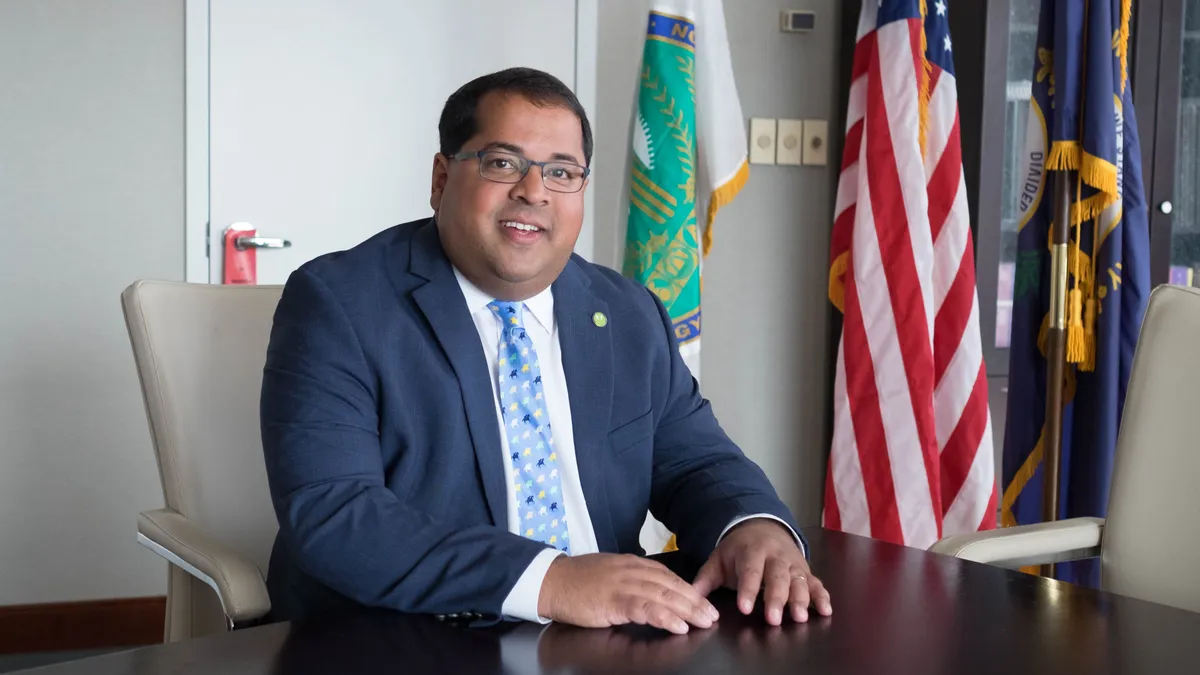Dive Brief
- Federal Energy Regulatory Commissioner Neil Chatterjee on Monday pulled back on calls for short-term payments for coal and nuclear plants, saying he believes a longer-term assessment of grid resilience is “more important.”
- Chatterjee last month outlined a plan to provide payments to coal and nuclear generators, concerned some could go offline as FERC considers a controversial subsidy proposal from the Department of Energy. While not providing the payments could be “problematic,” the commissioner said Monday his “first priority” is a longer-term resilience assessment.
- Chatterjee’s comments came days after Secretary of Energy Rick Perry granted a request from new FERC Chairman Kevin McIntyre for 30 more days to analyze the DOE proposal. The commissioner called that request “prudent,” but had declined comment on a rumored plan from other FERC regulators to order a long-term grid resilience analysis without short-term subsidies.
Dive Insight
Speaking at a Monday morning event in Washington, Chatterjee appeared to soften his position on what he’s termed “interim” payments for coal and nuclear plants, saying the top priority is a long-term grid resilience assessment.
“In doing that long-term analysis, if you have plants that prematurely shut down that we find out after the fact we needed, that would be problematic to me and I believe we could potentially regret that,” Chatterjee said. “But that said, the more important focus is answering the long-term question.”
Previously, Chatterjee said he was concerned by comments from “people that own the assets” — companies like coal generator FirstEnergy or nuclear operator Exelon — arguing their baseload plants could soon be forced offline.
“This isn’t what Neil Chatterjee thinks,” he told Utility Dive last month. “The people who are submitting the comments are the people that own these assets who are saying that the threat is imminent and that these plants are set on the current trajectory to be prematurely retired.”
Speaking to reporters after the event, Chatterjee said his new comments do not mean he is backing off from his interim plan, but that he has not yet secured the necessary votes to approve it.
“No one can govern by fiat at the commission — we've got to have consensus,” Chatterjee said. “I still would like to get consensus on an interim step but it's complicated. I myself have said I don't want to do anything to distort markets, to alter behavior, to unnecessarily cost consumers, so trying to land that is difficult, it's complex.”
Chatterjee said finding that balance — supporting plants without distorting market operations — has been the most difficult aspect of crafting his interim plan. The details of that proposal are still not final, he said, though it could look similar to the “show cause” order he outlined last month.
“I think that's certainly one of the options,” he said. “I continue to work at it and it's got to be something to me that does not distort markets does not hurt otherwise economic resources.”
Chatterjee again stressed that an interim proposal could be necessary because a longer-term resilience assessment will take significant time.
“It's complicated. I mentioned onstage there that what I'm seeing in terms of co-locating solar and storage, that's an exciting possibility to me that could demonstrate resilience,” Chatterjee said. “Certainly I think the characteristics of gas — gas is capable of providing baseload — that may answer the question that there is no problem with resilience, but we just need to do that analysis and that analysis will take time.”
The commissioner, who served as interim chairman before McIntyre was sworn in last Thursday, also pushed back on criticism that FERC processes have become politicized around the DOE proposal.
A lot of people keep hammering that FERC has become political and is ceding its independence,” he said. “But if you look at the manner with which we're handling it, we're doing it the way FERC always does it — a fact-based, data-based [process], through the record.”
“This has not been a political process; this is not a process ceding independence,” Chatterjee said. “Pressure from DOE, pressure from the administration is not a factor in this. We're going to go about our process and do this in the FERC way."













